 Petzlover
Petzlover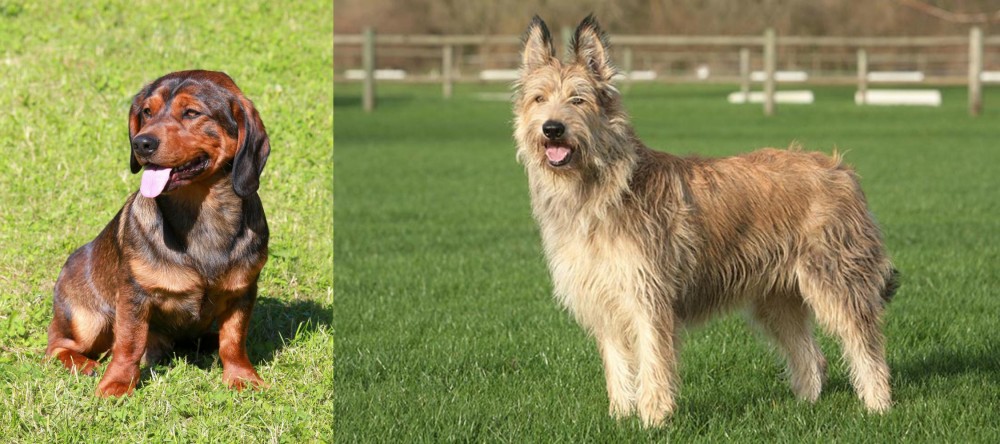 Alpine Dachsbracke is originated from Austria but Berger Picard is originated from France. Alpine Dachsbracke may grow 25 cm / 9 inches shorter than Berger Picard. Alpine Dachsbracke may weigh 14 kg / 30 pounds lesser than Berger Picard. Both Alpine Dachsbracke and Berger Picard has almost same life span. Alpine Dachsbracke may have less litter size than Berger Picard. Alpine Dachsbracke requires Moderate Maintenance. But Berger Picard requires Low Maintenance
Alpine Dachsbracke is originated from Austria but Berger Picard is originated from France. Alpine Dachsbracke may grow 25 cm / 9 inches shorter than Berger Picard. Alpine Dachsbracke may weigh 14 kg / 30 pounds lesser than Berger Picard. Both Alpine Dachsbracke and Berger Picard has almost same life span. Alpine Dachsbracke may have less litter size than Berger Picard. Alpine Dachsbracke requires Moderate Maintenance. But Berger Picard requires Low Maintenance
 They are aggressive enough for hunting and tracking large animals as well as small, but they are gentle enough to bring an injured animal back to the hunter without hurting it more.
They are aggressive enough for hunting and tracking large animals as well as small, but they are gentle enough to bring an injured animal back to the hunter without hurting it more.
At one time the breed was a crown favorite, accompanying Prince Rudolph of Habsburg on his hunting excursions. The Alpine Dachsbracke is still a favorite hunting breed but is now more often found as a family pet.
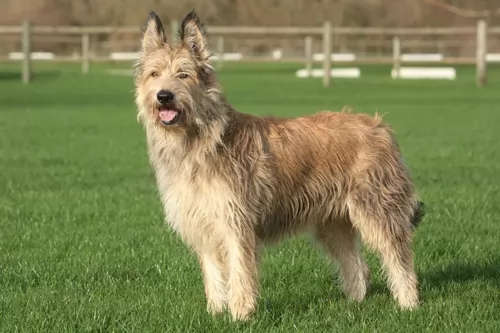 In the Picardie region of northeastern France saw visiting Celts/Franks enter the region along with a shepherd dog. They arrived in the Pas de Calais in 800 AD and might be the oldest shepherd dog of France. Named for Pacardy, the Berger Picard is certainly one of the most ancient of today’s French breeds. Some believe this shepherd comes from the lines of Dutch and Belgian Shepherds, while other insist he is related to the Beauceron and Briard.
In the Picardie region of northeastern France saw visiting Celts/Franks enter the region along with a shepherd dog. They arrived in the Pas de Calais in 800 AD and might be the oldest shepherd dog of France. Named for Pacardy, the Berger Picard is certainly one of the most ancient of today’s French breeds. Some believe this shepherd comes from the lines of Dutch and Belgian Shepherds, while other insist he is related to the Beauceron and Briard.
Never popular as a show dog due to its shaggy appearance, even though it was entered in Frances first dog show in 1863, the breed was almost extinct following the second World War. Currently there are a little under 5000 left in the world with most of them, 3000, in France. The Picard is a good herding dog and loved by the shepherds of the Picardy region. The United Kennel Club recognized the rare breed in 1994, but the AKC did not recognize it until 2016.
The Berger Picard is a loyal, people-oriented dog, good with children and families if socialized as a puppy. In 2006 the Berger Picard Club of America was formed as more and more dogs are being imported from France. There was a genetic study done this year that proposes that 7 breeds of shepherd all descended from a European herding dog that was all over Europe before 1859. This dog was the father of the Berger Picard, the German Shepherd, The Bergamaso Shepherd, the Lupino de Gigante, the Cane Paratore, the Cane da pasore della Lessinia e del Lagorai , and the Pastore d”oropa. After recognition, the Picard was shown for the first time at Krufts in March 2016. They followed that with a best of breed win by Gabby, Guess V.D. Benedicks
 The Alpine Dachsbracke is a short, stocky dog with a long body and short legs. It is big boned and robust with round eyes. It has black toenails and a short, dense red or black coat.
The Alpine Dachsbracke is a short, stocky dog with a long body and short legs. It is big boned and robust with round eyes. It has black toenails and a short, dense red or black coat.
The bridge of his nose is straight with a strong muzzle. Its forehead has a well defined furrow and black lips and nose. He is muscular and his chest is broad and deep. He holds his tail high and has a trotting gait.
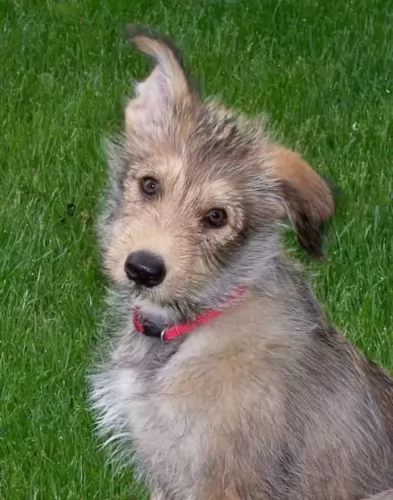 The Berger Picard is a muscular, medium sized, faithful companion. He is especially great with an owner who is athletic and energetic. They have a rugged constitution, slightly longer back, and full tail. The coat is thick, strong and harsh. They are never overweight or bulky. This gives the Berger Picard the look of a mixed breed dog. They have erect ears and thick eyebrows. This lanky looking dog is alert and lively. Movement is efficient, free and tireless. They have strong bones with a sturdy build and a take charge personality.
The Berger Picard is a muscular, medium sized, faithful companion. He is especially great with an owner who is athletic and energetic. They have a rugged constitution, slightly longer back, and full tail. The coat is thick, strong and harsh. They are never overweight or bulky. This gives the Berger Picard the look of a mixed breed dog. They have erect ears and thick eyebrows. This lanky looking dog is alert and lively. Movement is efficient, free and tireless. They have strong bones with a sturdy build and a take charge personality.
They have a strong rectangular head that is not massive. His eyes are oval and medium sized, never round or protruding. Eye color should be dark and never yellow. Cheek muscles are strong, and muzzle is smooth, ending abruptly at the nose. Scissors bite, deep chest and round feet. There should not be any dewclaws on the back legs.
 The Alpine Dachsbracke is a very lovable family dog even though he was bred to hunt and scent. They are great with kids and at their size are still good apartment, inside dogs. Though they need daily exercise they don’t need a large fenced in yard.
The Alpine Dachsbracke is a very lovable family dog even though he was bred to hunt and scent. They are great with kids and at their size are still good apartment, inside dogs. Though they need daily exercise they don’t need a large fenced in yard.
They are brave, intelligent and with a lot of stamina for the hunt or the walk. Take them on a hunting trip and they will adore you for it. Though they have plenty of power and endurance, they are not aggressive. However they are fearless and proud and need a strong pack leader for their human companion.
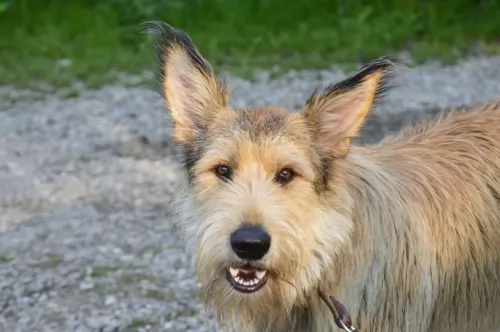 The Berger Picard needs to be a part of a pack with an owner who is clearly the pack leader. This is an intelligent, friendly, and sensitive to harsh voice scolding. They are not easy to train, and you need to be calm and patient when working with him. The Picard has a tendency to be stubborn with an owner who appears to be weak. If raised with or socialized to children and other animals, they will live fine with them. They are best in a rural environment rather than a close neighborhood. They are very quiet dogs, but they need a job and they excel at work.
The Berger Picard needs to be a part of a pack with an owner who is clearly the pack leader. This is an intelligent, friendly, and sensitive to harsh voice scolding. They are not easy to train, and you need to be calm and patient when working with him. The Picard has a tendency to be stubborn with an owner who appears to be weak. If raised with or socialized to children and other animals, they will live fine with them. They are best in a rural environment rather than a close neighborhood. They are very quiet dogs, but they need a job and they excel at work.
 They were bred to hunt and so are active dogs needing daily exercise and long walks.
They were bred to hunt and so are active dogs needing daily exercise and long walks.
They are at risk for back problems being long-backed dogs. The most common type of back problem is Intervertebral Disc Disease. This can cause pain and paralysis and can be caused by jumping, obesity or intense exercise.
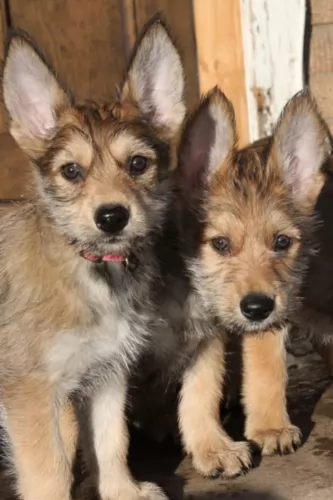 The Berger Picard is not a heavy or extra-large dog, but they still can have hip dysplasia, though it is not nearly as prevalent as it is in larger breeds. Eye infections can present in puppies more than adults and hereditary eye issues such as PRA and RD are all too common. (Progressive Retina Atrophy and Retinal Dysplasia)
The Berger Picard is not a heavy or extra-large dog, but they still can have hip dysplasia, though it is not nearly as prevalent as it is in larger breeds. Eye infections can present in puppies more than adults and hereditary eye issues such as PRA and RD are all too common. (Progressive Retina Atrophy and Retinal Dysplasia)
 Whether a puppy or adult the breed is subject to obesity and needs to be fed a good, vitamin filled dry dog food. At the same time they need the calories if they are active or hunting.
Whether a puppy or adult the breed is subject to obesity and needs to be fed a good, vitamin filled dry dog food. At the same time they need the calories if they are active or hunting.
About one quarter to one half cup twice a day.
About one half cup twice a day until they become seniors or less active then reduce to a fourth of a cup twice a day.
The Alpine Daschbracke was bred to work. He needs exercise at least a couple times a day.
This breed is playful and loves to find and retrieve. Daily exercise is essential.
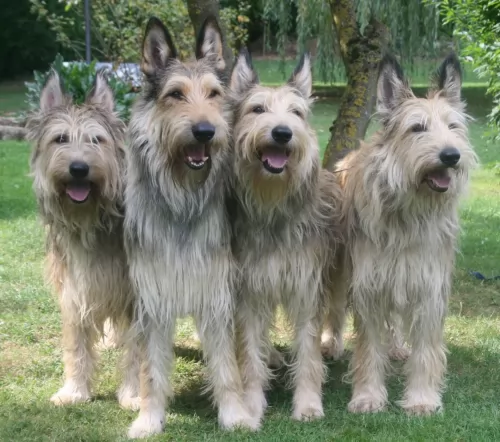 This is an athletic and active breed with a lot of energy. They need a high-quality food that is full of nutrients and not empty calories. Don’t overfeed him as some will have a tendency to become obese. They should be fed twice a day in equal proportions. Treats are good when training but don’t overdo it.
This is an athletic and active breed with a lot of energy. They need a high-quality food that is full of nutrients and not empty calories. Don’t overfeed him as some will have a tendency to become obese. They should be fed twice a day in equal proportions. Treats are good when training but don’t overdo it.
Since the Berger Picard has not been overbred, there are not a lot of genetic disorders in the breed. They do have some
You should have your puppy certified by the Orthopedic Foundation for Animals (OFA) and then the Canine Eye Research Foundation that they do not have these issues and if they do, resolve them. The results of these tests should be published in the OFA registry. This breed is also a participant in the Canine Health Information Center. This means their eyes and hips have been checked and the results published. Their blood is being stored for DNA purposes and one of the following have been evaluated: heart, elbows or thyroid. There is an OFA Berger Picard health survey whose results are available to anyone who asks. This does not track individual dogs but the breed as a whole.
This is a breed that needs a lot of exercise. She likes to swim, take long walks, take runs with you on your bike. They love to jog with you as well. Agility, obedience and any other type of competition will appeal to your Picard. However, don’t expect them to excel at competition because they are not consistent performers. But if they don’t get enough exercise and fun they will become very destructive. Barn hunt and non-competitive herding activities are perfect for the Picard.